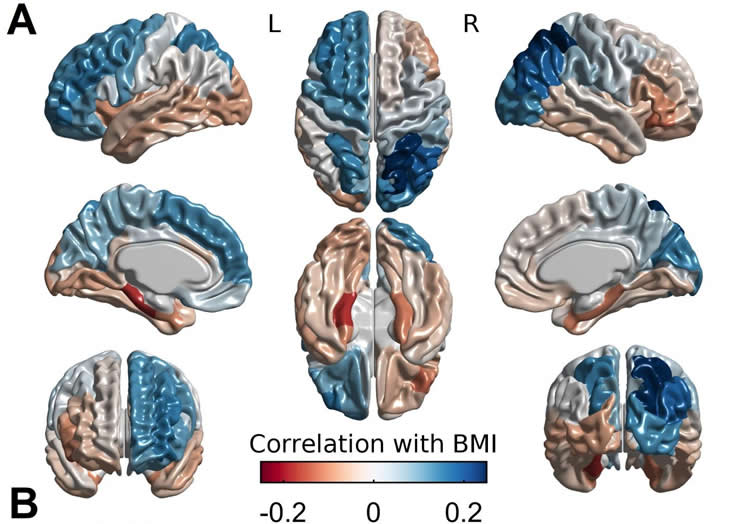Summary: A new study sheds light on the roles both genetics and neuroanatomy play in obesity. Researchers report those with higher BMI had reduced cognitive flexibility, reduced ability to delay gratification and worse verbal memory. Additionally, those with increased BMI have increased amygdala and left prefrontal cortex volume.
Source: McGill University.
Clinicians should consider how the way we think can make us vulnerable to obesity, and how obesity is genetically intertwined with brain structure and mental performance, according to new research.
The study, led by researchers at the Montreal Neurological Institute and Hospital (The Neuro) and published in the Proceedings of the National Academy of Sciences on Aug. 28, 2018, was an examination of magnetic resonance imaging (MRI) and cognitive test data from 1,200 individuals, supplied as part of the Human Connectome Project.
Researchers found that people with higher a body mass index (BMI) showed reduced cognitive flexibility, ability to delay gratification, visuospatial ability and verbal memory. They also found that people with increased BMI tended to have a thicker left prefrontal cortex and a thinner right prefrontal cortex. Previous studies have shown damage to the right prefrontal cortex can lead to increased eating.
Subjects with higher BMI also had increased volume in the left amygdala, which is believed to play a role in response to food cues. They also had decreased volume in the entorhinal-parahippocampal structures, which are associated with episodic memory and context mediation. This suggests a model where people prone to obesity are more sensitive to visual food cues, and less able to resist them by considering the negative context of eating, like weight gain.
Many of the subjects were siblings, including fraternal and identical twins. This allowed researchers to determine the heritability of the traits as well as obesity, measured by BMI. Using statistical methods, researchers found that many of the cognitive and neurological traits have genetic links with obesity. This suggests the role genetics play in obesity is manifested at least partially through brain anatomy and cognitive functions.

“This research will be useful in developing interventions to help people with obesity,” says study’s lead author, Uku Vainik, a researcher at The Neuro and the Institute of Psychology at University of Tartu, Estonia. “Modifying neurobehavioural factors with cognitive training, to improve people’s ability to resist food, for example, could hold promise. Interventions shouldn’t just focus on diet, but also acknowledge the neurobehavioural profile that obesity is genetically intertwined with. Such interventions might help people to stay lean despite their genetic signature.”
“This work adds support to the theory that body weight in humans is partly under control of higher-level brain systems involved in cognition, decision-making and motivation,” says Dr. Alain Dagher, the paper’s senior author. “Furthermore, individual differences in these brain systems that regulate food intake appear to be moderately heritable.”
Funding: This study was supported by funds from the Canadian Institutes of Health Research and the Natural Sciences and Engineering Research Council. Uku Vainik was supported by the Estonian Research Council, and Fonds de recherche du Québec – Santé (FRQS)
Source: Shawn Hayward – McGill University
Publisher: Organized by NeuroscienceNews.com.
Image Source: NeuroscienceNews.com image is credited to Uku Vainik.
Original Research: Open access research for “Neurobehavioral correlates of obesity are largely heritable” by Uku Vainik, Travis E. Baker, Mahsa Dadar, Yashar Zeighami, Andréanne Michaud, Yu Zhang, José C. García Alanis, Bratislav Misic, D. Louis Collins, and Alain Dagher in PNAS. Published August 28 2018.
doi:10.1073/pnas.1718206115
[cbtabs][cbtab title=”MLA”]McGill University”The Link Between Obesity, Genetics and the Brain.” NeuroscienceNews. NeuroscienceNews, 28 August 2018.
<https://neurosciencenews.com/genetics-obesity-brain-9762/>.[/cbtab][cbtab title=”APA”]McGill University(2018, August 28). The Link Between Obesity, Genetics and the Brain. NeuroscienceNews. Retrieved August 28, 2018 from https://neurosciencenews.com/genetics-obesity-brain-9762/[/cbtab][cbtab title=”Chicago”]McGill University”The Link Between Obesity, Genetics and the Brain.” https://neurosciencenews.com/genetics-obesity-brain-9762/ (accessed August 28, 2018).[/cbtab][/cbtabs]
Abstract
Neurobehavioral correlates of obesity are largely heritable
Recent molecular genetic studies have shown that the majority of genes associated with obesity are expressed in the central nervous system. Obesity has also been associated with neurobehavioral factors such as brain morphology, cognitive performance, and personality. Here, we tested whether these neurobehavioral factors were associated with the heritable variance in obesity measured by body mass index (BMI) in the Human Connectome Project (n = 895 siblings). Phenotypically, cortical thickness findings supported the “right brain hypothesis” for obesity. Namely, increased BMI is associated with decreased cortical thickness in right frontal lobe and increased thickness in the left frontal lobe, notably in lateral prefrontal cortex. In addition, lower thickness and volume in entorhinal-parahippocampal structures and increased thickness in parietal-occipital structures in participants with higher BMI supported the role of visuospatial function in obesity. Brain morphometry results were supported by cognitive tests, which outlined a negative association between BMI and visuospatial function, verbal episodic memory, impulsivity, and cognitive flexibility. Personality–BMI correlations were inconsistent. We then aggregated the effects for each neurobehavioral factor for a behavioral genetics analysis and estimated each factor’s genetic overlap with BMI. Cognitive test scores and brain morphometry had 0.25–0.45 genetic correlations with BMI, and the phenotypic correlations with BMI were 77–89% explained by genetic factors. Neurobehavioral factors also had some genetic overlap with each other. In summary, obesity as measured by BMI has considerable genetic overlap with brain and cognitive measures. This supports the theory that obesity is inherited via brain function and may inform intervention strategies.






